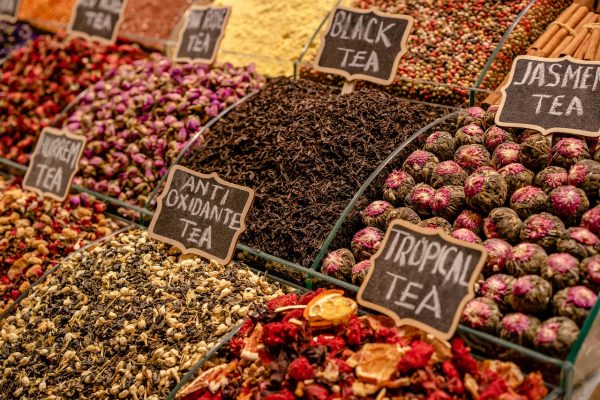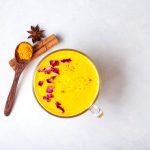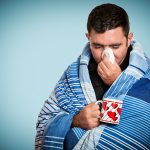I don’t think people realize that herbal teas aren’t really tea, per say. Green and black teas all come from the same Camellia sinensis plant. The difference between them comes from green tea being steamed after the leaves are harvested. This prevents oxidation and increases levels of health boosting EGCG (Epigallocatechin).
Herbal teas, on the other hand, are made using the leaves, stems, roots, flowers, bark, seeds or petals of specific herbal plants. So they are more of an herbal infusion, even though we call them herbal teas.
And we’ve all used one or more of these herbal concoctions at some point in our lives.
When I was growing up there was always some chamomile tea on hand to help us sleep. We had ginger or peppermint tea for those occasional stomach upsets or bouts of nausea. They were just standard home remedies.
At the time, I don’t think anyone was really thinking about all of the antioxidant rich polyphenols found in these herbal preparations. Many of them have positive effects we never even imagined back then!
They are anti-inflammatory, boost the immune system, lower blood pressure, reduce blood sugar levels and have anti-cancer activities. Some are antiviral or antibacterial. Some have anti-anxiety and anti-depressive effects.
So nearly all herbal teas are going to have a positive effect on your life. But there are certain herbs that are a near-perfect treatment for specific problems. So let’s take a look at a few herbal teas that can cure what ails you.
Sleep Better, Feel Better, Think Better
Chamomile tea for better sleep. Chamomile is best known for its sedative effect. It’s a mild tranquilizer that helps people not only fall asleep faster, but sleep better. It even has a significant effect in older people with age-related insomnia. But while you might be drinking chamomile for better sleep, you are also getting a lot of extras.
One of chamomile’s super powers is its ability to help reduce anxiety in people with generalized anxiety disorder (GAD). In fact, chamomile has been shown to work just as well as conventional drug therapy in moderate to severe GAD, without the side effects of medications. It also seems to help with depression that often accompanies anxiety.
Ginger tea for nausea and indigestion. Ginger has been used since ancient times as a traditional remedy for gastrointestinal complaints. And a cup of ginger tea is still very well-known for its effect on almost any type of digestive issue – from heartburn to peptic ulcers and acid reflux.
Ginger’s stomach-soothing effects are so powerful that it can even offset the nausea and vomiting associated with chemotherapy.
But the health effects of ginger don’t stop with your digestive tract. It’s also a powerful anti-inflammatory that can relieve pain, stiffness and muscle aches brought about due to arthritis or excess exercise.
So whenever you drink a cup of ginger tea to soothe your digestive woes, you’re also taking steps to end some of those nagging aches and pains.
Ashwagandha tea for energy and mental clarity. Ashwagandha is a potent energizer and stress reliever. In the world of Ayurvedic medicine, it’s known as a nerve tonic and memory enhancer.
It is an adaptogenic herb that works by correcting imbalances within the body. And if you need energy and mental clarity during the day, drinking ashwagandha tea is the perfect way to get it. The herb enhances both immediate recall and general memory. It also sharpens executive function, attention span and mental processing speed.
In addition to boosting your memory and helping your brain work faster, ashwagandha is an excellent mood stabilizer. This is especially true for people who feel run-down and out-of-sorts due to high stress and anxiety levels. It’s also being used by some alternative physicians for people with long Covid.
Finding the Right Herbal Teas for You
These are just a few herbal teas that target specific conditions, yet still come with other powerful health effects. There are a lot more that you can check out.
Peppermint tea before meals is great for digestion and also for IBS symptoms. Cinnamon tea can help regulate blood sugar. Feverfew might be helpful for migraine relief. Lemon balm lifts the spirit. Siberian ginseng boosts energy. Elderberry and echinacea are both excellent for treating colds.
It’s a long list, but most of them make tasty herbal teas. Or, if not tasty (echinacea is always pretty much terrible tasting), you can at least cover up the taste by adding honey, fruit, spices or other herbs to the blend.
Most of the herbs on this list are available as either dried herbs or tinctures. They can be combined for flavor and potency, and enjoyed either iced or hot, anytime.
Bringing “tea time” into “me time” is one of the simplest ways to make any day a better day.
SOURCES:
Poswal FS, Russell G, Mackonochie M, MacLennan E, Adukwu EC, Rolfe V. Herbal Teas and their Health Benefits: A Scoping Review. Plant Foods Hum Nutr. 2019 Sep;74(3):266-276.
Chandrasekara A, Shahidi F. Herbal beverages: Bioactive compounds and their role in disease risk reduction – A review. J Tradit Complement Med. 2018 Aug 9;8(4):451-458.
Hacioglu M, Dosler S, Birteksoz Tan AS, Otuk G. Antimicrobial activities of widely consumed herbal teas, alone or in combination with antibiotics: an in vitro study. PeerJ. 2017 Jul 26;5:e3467.
Adib-Hajbaghery M, Mousavi SN. The effects of chamomile extract on sleep quality among elderly people: A clinical trial. Complementary Therapies in Medicine. 2017 Dec;35:109-114.
Amsterdam JD, Li Y, Soeller I, Rockwell K, Mao JJ, Shults J. A randomized, double-blind, placebo-controlled trial of oral Matricaria recutita (chamomile) extract therapy for generalized anxiety disorder. J Clin Psychopharmacol. 2009 Aug;29(4):378-82.
Keefe JR, Mao JJ, Soeller I, Li QS, Amsterdam JD. Short-term open-label chamomile (Matricaria chamomilla L.) therapy of moderate to severe generalized anxiety disorder. Phytomedicine. 2016 Dec 15;23(14):1699-1705.
Amsterdam JD, Shults J, Soeller I, Mao JJ, Rockwell K, Newberg AB. Chamomile (Matricaria recutita) may provide antidepressant activity in anxious, depressed humans: an exploratory study. Altern Ther Health Med. 2012;18(5):44-49.
Ryan JL, Heckler CE, Roscoe JA, Dakhil SR, Kirshner J, Flynn PJ, Hickok JT, Morrow GR. Ginger (Zingiber officinale) reduces acute chemotherapy-induced nausea: A URCC CCOP study of 576 patients. Support Care Cancer. 2012 Jul; 20(7): 1479–1489.
Bartels EM, Folmer VN, Bliddal H, Altman RD, Juhl C, Tarp S, Zhang W, Christensen R. Efficacy and safety of ginger in osteoarthritis patients: a meta-analysis of randomized placebo-controlled trials. Osteoarthritis Cartilage. 2015 Jan;23(1):13-21.
Black CD, Herring MP, Hurley DJ, O’Connor PJ. Ginger (Zingiber officinale) reduces muscle pain caused by eccentric exercise. J Pain. 2010 Sep;11(9):894-903.
Choudhary D, Bhattacharyya S, Bose S. Efficacy and Safety of Ashwagandha (Withania somnifera (L.) Dunal) Root Extract in Improving Memory and Cognitive Functions. J Diet Suppl. 2017 Nov 2;14(6):599-612.
Chandrasekhar K, Kapoor J, Anishetty S. A prospective, randomized double-blind, placebo-controlled study of safety and efficacy of a high-concentration full-spectrum extract of ashwagandha root in reducing stress and anxiety in adults. Indian J Psychol Med. 2012;34(3):255-262.
Auddy B,et al. A standardized Withania somnifera extract significantly reduces stress-related parameters in chronically stressed humans: a double-blind, randomized, placebo-controlled study. J Am Neutraceut Assoc. 2008;11:50–56.



